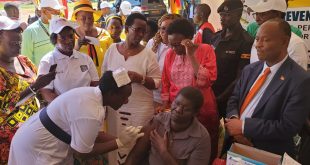BY EDWARD AKAKI, TIMOTHY EODU- MOROTO

A 2021 survey by National Population Council shows that Karamoja has the highest fertility rates in Uganda standing at Total Fertility Rate (TFR) of 7.9 compared to the country’s average of 5.2.
Also, 46% of pregnancies in Uganda are unintended with the mean desired total fertility rate being 4.82 in 2016 but the total fertility rate still hitting 5.4 that same year.
With the above data, it is estimated that 415,000 abortions are carried out in Uganda annually, most of which are unsafe.
In a Family Planning Dialogue organized by Performance Monitoring for Action (PMA) in partnership with Marie-Stopes and Makerere University School of Public Health held on 31st March, 2023 at hotel African Moroto, health workers from the different parts of the region suggested different issues and ways to improve the intake of Family Planning.
Dr. Francis Enabu from Nabilatuk District said issues of family planning is not being well perceived in the region basing on the numbers adding that the main gap is the mindset of most mothers who are more concerned of the side effects of the various Family Planning methods especially injectables.
Enabu attributed family planning problems to the knowledge gap especially in hard to reach areas that have no connection to electricity, network for communication, poor roads among others.
He called for more mentorship of health workers in such areas and as well for the sensitization of the communities on different methods that are medically approved.
According to Andrew Rews Ilukol the District Health Officer – Karenga, health education has been forgotten and yet statistics show that girls in schools have better understanding than those at home.
He called for the involvement of Manyatta or home leaders in the family planning conversations so that they are able to channel the information down in the villages adding that there is need to produce materials in local language for better understanding.
Raymond Ssebatta National Medical Stores (NMS) Pharmacist Regions representative says there is need to build capacity of health workers in quantifying especially family planning stock so that NMS can supply enough quantity.

He said NMS provides medicine for side effects of family planning but some medics may not have knowledge and as such a need for more capacity building.
Ssebatta said the procurement process of stocks takes long therefore in-charges in various facilities need to do early pre orders but also understand what they exactly need to avoid delays.
Dr. Gabriel Quise Achia, the Medical Superintendent Kotido Hospital says under staffing in most facilities is affecting family planning as the same health worker may be handling over one department hence being non productive and unable to concentrate time on family planning and or sensitise clients about it.
Regina Narus – Assistant DHO Napak said Karimojongs used to be the best at family planning in the past since the male would migrate into the grazing lands and only return at certain times of the year.
She attributed population increase to the rampant alcoholism in the region that led to increase in sexual Gender Based Violence against women and girls in the region.
Narus called for use of poster massaging for the illiterate populations in the region especially elders to address mindset change through better packaging of the information.
Marie Stopes Social Behavior Change lead, Sam Ariko says they are working with 668 public health facilities and have mentored over 114 private clinics to provide family planning voucher services.

He says they also have 19 outreach teams working everyday at Health Centre IIIs, IIs and community level with VHTs through community dialogues in the Manyattas, megaphone van drives and call center coordinating with other IPs and districts to reduce overlaps
Study says improved spacing and timing of pregnancy allows the mother’s body to recuperate and delaying childbearing until after adolescence allows girls’ bodies to develop completely.
Vision 2040 set out to be achieved are to invest in rapidly growing population, by use of modern contraceptives, addressing infant mortality to build confidence in parents, investing in quality education to ensure productive population after education and addressing high fertility rate by use of family planning since 46% of pregnancy in Uganda are unintended.



